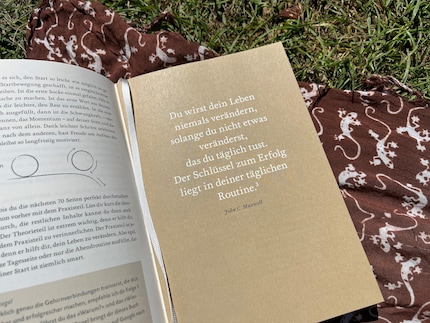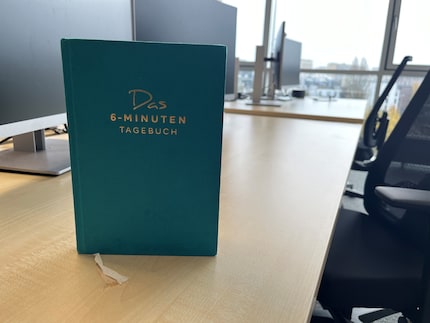

Happiness by instruction? How I (almost) failed at the 6-minute diary
3 minutes in the morning, 3 minutes in the evening: that should be enough to make you happier in the long term. You can read here whether it worked for me.
Six minutes of my daily time in exchange for more happiness, satisfaction and joy in life. A tempting offer, but one that sounds a little too good to be true. That's what I thought when I started the 6-minute diary a few months ago. But from the beginning ...
Putting gratitude on paper: All beginnings are hard
I have resolved countless times to keep a gratitude diary. To write down a few things every day that I am grateful for. It shouldn't really be a big problem, after all, I appreciate a lot about my life. Nevertheless, so far I've always struggled to put it into practice. A few half-baked attempts with vague and irregular notes and several notebooks that only have a few meagre entries on the first few pages - that's all I've managed so far. After a few days at the latest, my laudable resolution sank miserably into the everyday mire and I was left frustrated. But now everything is about to change.
This time I'm going to try my hand at it with support: the 6-minute diary. With guidance and specific questions, will I become a diarist after all?

Small effort - big effect?
This is the promise of the diary: three minutes in the morning, three minutes in the evening and thanks to positive psychology you will increase your well-being and write yourself happier over time. The book's success and sales figures suggest that there might actually be something behind it.
Now you're not getting an empty diary for your money that you fill with random thoughts at random. Instead, you get well thought-out instructions including a personal introduction by author Dominik Spenst. In addition, there is an understandable scientific background to the topic and finally diary pages with specific questions, suggestions and quotes for six months of happy writing.
Thankfulness as the key to happiness
I first took the time to read through the first 90 pages of the book before I started the actual diary writing. The explanations are coherent, Spenst argues on a scientific basis and avoids dubious, exaggerated promises. I like that. The author can even score points with his own effectiveness study on the 6-minute diaries. Time for my personal practical test.
Writing a gratitude or happiness diary to increase your own well-being is not a new idea and its effectiveness is now well documented. In the 6-minute diary, there is a page in the book for each day, which helps you to focus with specific questions. Quotes, sayings and short anecdotes stimulate your thoughts. In addition to the daily pages with a section for three minutes in the morning and three minutes in the evening, there are other tasks:
- five additional weekly questions to answer
- one self-assessment check per month
- Space for notes and ideas

Source: Anna Sandner
At this point, it already dawned on me that it would hardly be possible to implement all this content in six minutes a day. But that's the promise that (probably not only) convinced me to give it a go.
Six minutes, my arse ...
In fact, I quickly realise that the six minutes are more of a metaphor. I don't manage to stay within the specified time once in the entire first week. Maybe I need to get into the groove first? But it's probably not just me who finds it difficult to write down at the touch of a button how I can best ensure a good day or list three things I'm grateful for.
I also can't answer the additional questions such as "At what age have you been the happiest so far?" or "How would you describe your last year in one sentence?" without at least thinking for a moment. I also very much doubt that the desired satisfaction effect will materialise if I don't deal with the questions and my answers. So in my view, the six minutes are more of a marketing strategy than really realistically useful. A first downer, I have to admit.
Surprise at the beginning
Apart from that, however, I'm having a really good start to the first week of trialling my new companion. On the first day, I'm doing really well. Coincidence or the actual effect of the book? Or rather: Was I finally able to bring myself to start the diary because I had a really good day? Or was the day so good because I started the diary? As is so often the case, the answer probably lies somewhere in between. Three (or rather seven) minutes of positive thoughts in the morning will hardly have the power to make my whole day magical. But the effect lasts the whole week. I am satisfied, I can admit that without embellishment. I can't say whether it was the diary or not.

Source: Anna Sandner
Disillusionment after a short time: stress instead of satisfaction
Unfavourably, the good mood does not last beyond this first week. It may have been pure coincidence anyway. My mood was good, but otherwise it wasn't that bad either. And after about ten days, another, completely unwanted feeling creeps in: I'm stressed. Oops, that wasn't the plan. But after the initial euphoria comes the collapse. I don't manage to write in the diary for two days in a row. This is immediately followed by a guilty conscience. Great. Over the next few days and weeks, the two daily entries become a compulsory programme. That puts me under pressure. It becomes an item on my to-do list that has to be completed. And so I let it slide more and more often and instead of feeling more satisfied, I have a guilty conscience whenever I miss the entry.
Diary with cutbacks: Does it really have to be daily?
After about three weeks, it gets too boring for me. I need a new strategy, it doesn't make much sense like this. So I decide to accept my own intuitive middle ground: From now on, I'll write in the diary sporadically - and when time and my mood actually allow it. From now on, I don't even care about the three minutes that are constantly hovering over me like a sword of Damocles. It takes as long as it takes.
A good decision - for me at least. Over the coming weeks and months, I was able to get into the habit of constantly looking at what makes my life worth living without it feeling like a chore.
Conscious gratitude pays off
Consciously focussing on what is good has made more of a difference than I expected. After a while, I actually started to feel more satisfied, which I am still benefiting from. This is completely subjective, of course, and it remains to be seen whether it is due to expectations or really the diary. In the end, what counts for me is the result and it was worth it. Especially as I haven't yet mentioned another plus point: Many years from now, when I look back, I will have created a wonderful, personal testimony for myself.
The 6-minute diary would not have been necessary. In the end, an ordinary notebook would have sufficed for my purposes. Nevertheless, it really helped me personally to get started with diary writing in the first place. And I wouldn't want to miss the theory section at the beginning, as well as the monthly questions.
If you want to know how I did in my other trial weeks, you can read more here:
Science editor and biologist. I love animals and am fascinated by plants, their abilities and everything you can do with them. That's why my favourite place is always the outdoors - somewhere in nature, preferably in my wild garden.
Interesting facts about products, behind-the-scenes looks at manufacturers and deep-dives on interesting people.
Show all


